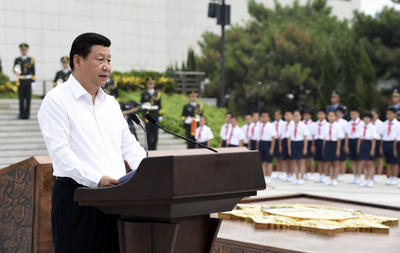China’s response to Japan’s reinterpretation of the constitution has been predictably negative. The official Xinhua news agency described the changes as a ‘brutal violation’ of the spirit of Japan’s pacifist constitution, while the Chinese Foreign Ministry in more muted tones suggested that constitutional reinterpretation raised doubts about Japan’s commitment to peaceful development.
In the weeks since the Abe government’s announcement, two themes have become particularly notable in Chinese official and academic commentary.
The first is staunch criticism of the way in which the Abe government circumvented Japanese public opposition to lift the ban on collective self-defence. Instead of making these changes by formally revising the constitution — which would require support from two-thirds of each house of the Japanese parliament and 50 per cent of the Japanese public — the Abe government instead opted for the simpler path of constitutional reinterpretation via a cabinet decision. This required the unanimous support of only the 19 members of the cabinet, and amendments to relevant laws to implement to reinterpretation will require support from 50 per cent of each house of parliament.
Chinese officials and academics alike have roundly censured the Abe government for ignoring the considerable portion of the Japanese public that opposes these changes to national security policy. Chinese Foreign Ministry spokesman Hong Lei noted the strong public opposition within Japan to lifting the ban on collective self-defence, while Wang Ping from the Institute of Japanese Studies at the Chinese Academy of Social Sciences argued that Abe was acting in defiance of the long-held norm of ‘pacifism’ in Japan. Indeed, one of China’s leading Japan-watchers, Lian Degui of the Shanghai Institutes for International Studies, has predicted that Abe’s willingness to ignore Japanese public opinion on this issue will lead to the downfall of his government.
Highlighting Japanese public opposition to major security reforms is a strategy that Chinese officials have adopted frequently over the past sixty years. In the 1950s and 1960s, Chinese Foreign Ministry officials regularly described the intricacies of Japanese Diet debates or public protests about the US-Japan alliance on the pages of the People’s Daily in order to reach out to the Japanese public and build opposition to changes in Japan’s security policy.
Yet, as in the 1950s and 1960s, this strategy is unlikely to have much success.
While Japanese public opinion remains divided on the issue of collective self-defence, China’s ability to exploit these divisions is limited. China’s own non-representative government weakens China’s credibility in criticising the Abe government for ignoring public opinion. Similarly, China’s behaviour in the East China Sea in recent years means that the Japanese public will most likely view China as a self-serving actor on this issue.
The second theme to have dominated Chinese responses to Japan’s constitutional reinterpretation is condemnation of the Abe government for undermining the post-World War II international order. The ‘post-war international order’ championed by China’s leaders and People’s Daily editorials is one in which Japan occupies a very particular role as an ‘abnormal’ non-military power. Japan’s ‘pacifist’ constitution is a major symbol of this post-war international order, requiring as it did that Japan renounce ‘the threat or use of force as means of settling international disputes’ and prohibiting Japan from developing military forces.
Though it has been steadily reinterpreted by the Japanese government over the past sixty years — for instance allowing Japan to develop its Self-Defense Forces and to participate in international peacekeeping operations — Japan’s ‘pacifist’ constitution has broadly kept Japan constrained as an ‘abnormal’ power not permitted to use force abroad. The Abe government’s constitutional reinterpretation has therefore been condemned by Chinese leaders because it allows Japan to further break free from this particular post-war status and, more importantly, to take military steps that could be seen to counter China’s rise.
The July reinterpretation is highly significant for regional security because it will force China to confront the possibility of dealing with a more ‘normal’ and powerful Japan in East Asia. We have yet to see much creative thinking in China about how to deal with such a Japan. Still, the Abe government may have forced China to start.
Amy King is a Lecturer in the Strategic and Defence Studies Centre at the Australian National University.

